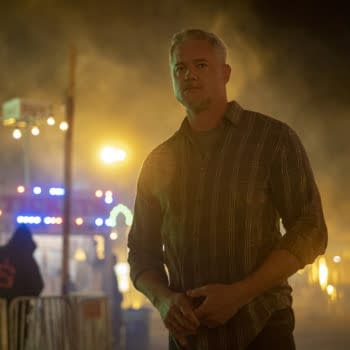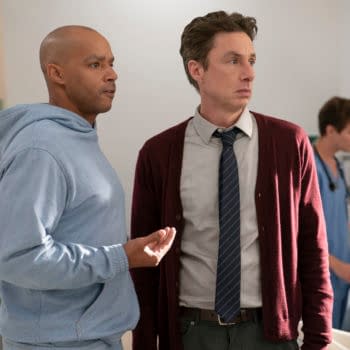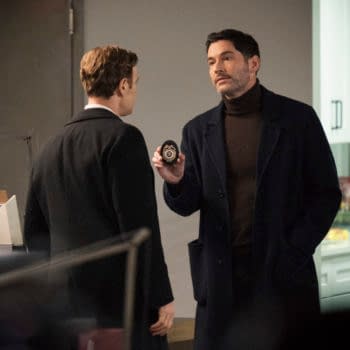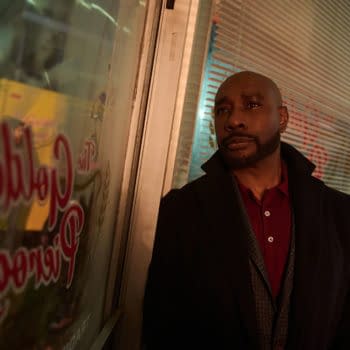Posted in: NBC, TV | Tagged: Charles Robinson, Harry Anderson, John Larroquette, markie post, Marsha Warfield, nbc, Night Court, opinion, Richard Moll
Night Court: Some Memories of a Classic Sitcom's Enduring Legacy
Growing up Night Court became one of the most one-of-a-kind unique experiences in sitcoms since it takes place within the criminal justice system, which is generally monopolized in prime time by gritty procedurals. While I was too young to experience the series in its initial seasons, I started watching around seasons 3-4 and stuck around to the NBC series until its final ninth season in 1992. On the heels of the recent passing of cast members Charles Robinson and Markie Post and not too far removed from Harry Anderson's in 2018, it just feels unfathomable that this can be happening at the time when a reboot pilot from star Melissa Rauch and original star John Larroquette is underway.
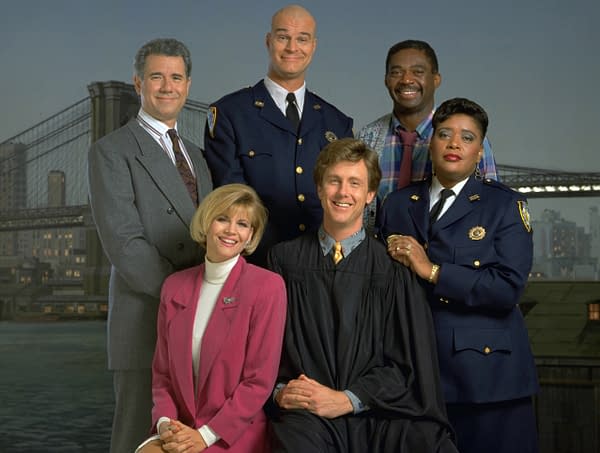
Perhaps fate has a cruel way of rendering its ugly head in some way once again. Let's back things up a bit. The series was created by Reinhold Weege in 1984 for NBC. So the only cast members from season one to its final ninth are Anderson, Larroquette, and Richard Moll. The other first-season cast were Karen Austin, Gail Stickland, and Selma Diamond in the roles of court clerk Lana Wagner, Public Defender Sheila Gardiner, and Bailiff Selma Hacker, respectively. There were numerous cast changes in Austin leaving in favor of Robinson's Mac Robinson in season three. Paula Kelly's (d. 2020) Liz Williams took over for Gardiner in the second episode for the remainder of the first season. Post's Christine Sullivan and Ellen Foley's Billie Young took over the public defender role from Kelly's Williams in season two before Post took over permanently in season three. Foley's presence was due to Post's obligation to TV's The Fall Guy.
Then there's the issue of the female bailiff that worked alongside Moll's Bull Shannon starting with Diamond, who had to be replaced due to her passing from lung cancer in 1985 with Florence Halop's Florence Kleiner for season three. That would be Halop's only season, with the actress also passing away from lung cancer, in 1986. Marsha Warfield's Roz Russell took over the role for the remainder of the series. Night Court's strengths were based on the show's personalities and writing from the top-down. You just knew that Anderson's Harold T. Stone was the kind of everyman personality that broke the mold of the curmudgeon and crotchety judges that you might be used to seeing compared to The People's Court's Judge Joseph Wapner and every other TV personality judge thereafter. Mac provided equal parts sass and straight man to the over-the-top cases they had. The fact that Larroquette won four of his five Emmys from playing the lecherous and scheming state prosecutor was no fluke. Yes, Dan Fielding is by no ways a #MeToo-friendly character today, but the fact is he always received his comeuppance similar to his cartoonish-contemporary in Al Bundy on Married with Children shows why the character worked so well.
Post's Sullivan not only played her character straight always fending off Fielding's advances, sleaze, and snide remarks, but she became an inspirational feminist character on a sitcom. Her stoic presence helped provided a cohesive glue that endured from her presence on the show. Moll's Bull became a beloved character for his minimalist ways and a soft-spoken disarming personality that created so many layers to his hulking frame. There's Roz, who provided as much sass and then some as her predecessors and took it to the next level with her no-nonsense ways. Every line from Warfield was gold because it evokes, "Sick of your shit".
It wasn't just the core cast that made the series work. It had a wealth of recurring guest stars and characters that would have been worthy of their own spinoffs like Mike Finneran's building handyman Art, singer Mel Torme playing a fictionalized version of himself, William Utay's Will and Phil Sanders (Dan's lackey), Brent Spiner and Annie O'Donnell's Bob and June Wheeler, S. Marc Jordan's visually impaired vendor Jack, Joleen Lutz's stenographer Lisette, and Denice Kumagai's Quon Le Robinson. Mac and Quon Le provided a rare sight in the 80s, a positive portrayal of a non-white interracial marriage. Night Court was so over-the-top at times, it never needed to take itself too seriously and was always good for a slice-of-life laugh.
Bleeding Cool TV on Instagram: For all of the stuff too random and bizarre to make the site, make sure to follow us on Instagram: Bleeding Cool TV (@bleedingcooltv).
BCTV Daily Dispatch: For a look at what's going on across the television and streaming landscape, sign up for Bleeding Cool's daily email round-up of the news you need to know here.







